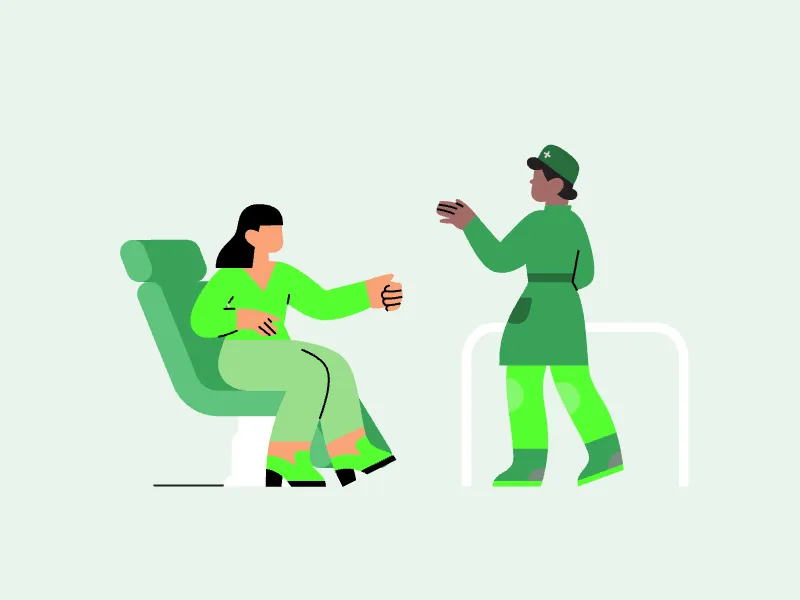What is overeating?
Overeating refers to consuming more calories than what the body requires for fuel. It can manifest in a number of ways, including:13
- Eating when not hungry
- Eating beyond the point of feeling full
- Eating more quickly than normal
Everyone overeats occasionally. Certain holidays and events, specifically, tend to revolve around food and the idea of feasting.
But some people struggle with chronic overeating. In these cases, the behavior is often driven not by external celebrations but by internal feelings and mental health conditions and concerns.
Overeating vs. binge eating
While closely related to binge eating, overeating refers more to the broader experience of eating beyond the body's need for food. Binge eating is generally more episodic.
When described as part of binge eating disorder (BED) or bulimia nervosa (BN), binge eating is thought of as the consumption that takes place during a certain period of time, usually defined as within a two-hour window.14
On the other hand, there are no time limits involved in measuring overeating, nor is the term defined in the Diagnostic and Statistical Manual of Mental Disorders (DSM-5).
Overeating and anxiety disorders
Overeating has been connected to the experience of anxiety, with the relationship found to go in both directions: Mood can impact the amount someone eats, while the amount someone eats can also impact their mood.1
In one study, generalized anxiety disorder was tied specifically to disinhibition, or the loss of control over how much is consumed, and hunger, as described as the susceptibility to internal or external hunger cues.6
In some ways, the link may be biological. Much like stress, anxiety is associated with elevated levels of cortisol, the "fight or flight" hormone. Cortisol can have a cascade of impacts on the body, among them the drive to find food. It can also be responsible for particular cravings for foods that are high in sugar, fat, or salt.13,15
And a lack of adequate coping mechanisms in the face of increased stress and anxiety may also contribute to the connection. In one study of adolescents who struggled with overeating, 40% of respondents reported feeling a loss of control over how much they ate, in response to experiences of anxiety.3
Overeating as a trauma response
One of the most common anxiety disorders is post-traumatic stress disorder (PTSD). And the condition, as well as other types of trauma, has also been connected to disordered eating behaviors, including the kind of excessive eating that takes place in a binging episode.16
Trauma and stress can damage pathways in the brain, impair some neurological functions, and manifest as maladaptive coping mechanisms, including addictive or compulsive behaviors. Similarly, those who have experienced trauma or are under ongoing stress sometimes turn to addictive substances or food in an effort to self-soothe or deal with unpleasant feelings.4
The landmark Adverse Childhood Events (ACE) study showed that the number of traumatic, or stressful, events someone experienced as a child also increased their chances of developing a number of future mental illnesses, including addiction, and raised the odds of them becoming mildly or severely overweight.4,5
Depression and overeating
Among mental health disorders, depression also has a close tie to emotional eating and a number of eating disorders. Research has shown that many individuals with major depressive disorder use food to self-soothe, and are at an increased risk of weight gain and chronic disease.7
Once again, foods high in fat, sugar, and carbs may play a role. These foods may help combat the negative feelings associated with depression, triggering a release of the neurotransmitter dopamine, which is connected to feelings of pleasure, motivation, and satisfaction.2
Eating also triggers the parasympathetic nervous system, which activates the "rest and digest" response, the opposite of fight or flight. The combined hormonal influx and nervous system switch can result in a calming effect, which someone may subconsciously come to rely on to help them cope with depression.
And people who have depression also tend to experience interpersonal conflict, which can also contribute to the sense of a loss of control, overeating, and binge eating.8,11
Treating anxiety, depression and overeating
Thankfully, there are a number of treatments that can help someone with anxiety, depression, and compulsive overeating.
Therapy
Many different forms of psychotherapy have been found to help people with both mood and eating disorders.
In particular, cognitive behavioral therapy (CBT), dialectical behavioral therapy (DBT), and interpersonal psychotherapy (IPT) have all been found effective for curbing binge eating episodes.12
Movement
Yoga is another evidence-based approach to address overeating.
In one study, a 12-week yoga treatment program was found to help create a healthier reconnection to food, reduce the amount of food eaten, slow eating speed, and lead to different food choices in women who struggled with binge eating episodes. Over time, this led to more positive outcomes in general wellbeing.10
Meditation
Meditation and mindfulness are incorporated in many different types of eating disorder treatment, and can also help with anxiety and depression.
The techniques have been found to help those who struggle with overeating cultivate greater awareness of their physical state, including hunger and fullness, as well their emotional, social, and environmental triggers.9
Medication
It’s important to remember that medication is just one component of a comprehensive, multidisciplinary treatment plan for someone who is struggling with their mental health and harmful behaviors.
Still, there are some medications that have been approved for help with either anxiety, depression, binge eating, or some combination of these traits:17,18
- Vyvanse (generic name lisdexamfetamine) targets this dopamine pathway and can be helpful in reducing the urge to overeat.
- Prozac (Fluoxetine) is typically prescribed for depression but can also be helpful in managing overeating tendencies.
Help is within reach
If you or a loved one are overeating on a regular basis, it may be time to reach out for help. Our clinical care team can help you get the best treatment for your specific needs. Call now to learn more about how to take your first steps toward a healthier, happier future.
Call us | (866) 293-0041 Finding help for overeating
Everyone overeats once in a while, and there's nothing wrong with occasional indulgences. But overeating on a regular basis can lead to health complications in and of itself, and indicate that something deeper may be wrong.
When food is used to cope with unpleasant feelings or difficult situations, treatment may be helpful to not only reduce the tendency to overeat, but help address the root issues driving the behavior.
You might be interested in






































